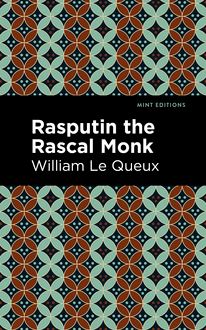-
 Univers
Univers
-
 Ebooks
Ebooks
-
 Livres audio
Livres audio
-
 Presse
Presse
-
 Podcasts
Podcasts
-
 BD
BD
-
 Documents
Documents
-
- Cours
- Révisions
- Ressources pédagogiques
- Sciences de l’éducation
- Manuels scolaires
- Langues
- Travaux de classe
- Annales de BEP
- Etudes supérieures
- Maternelle et primaire
- Fiches de lecture
- Orientation scolaire
- Méthodologie
- Corrigés de devoir
- Annales d’examens et concours
- Annales du bac
- Annales du brevet
- Rapports de stage
La lecture à portée de main
Vous pourrez modifier la taille du texte de cet ouvrage
Découvre YouScribe en t'inscrivant gratuitement
Je m'inscrisDécouvre YouScribe en t'inscrivant gratuitement
Je m'inscrisEn savoir plus
Vous pourrez modifier la taille du texte de cet ouvrage
En savoir plus

Description
Rasputin the Rascal Monk (1917) is a work of historical nonfiction by Anglo-French writer William Le Queux. Published at the height of Le Queux’s career as a leading author of popular thrillers, Rasputin the Rascal Monk indulges in the paranoid atmosphere of the First World War to weave a sinister tale of espionage and political conspiracy. Despite the popularity and accessibility of his work, Le Queux was genuinely concerned—and immensely paranoid—about the realities of international espionage, using his own research and experience to piece together otherwise shadowy narratives for his readers. Toward the end of the First World War, William Le Queux turned his attention from Germany to the looming threat of Russia. In this dedicated—though factually loose—recreation of the life of Rasputin, Le Queux investigates one of history’s great anomalies: the ability of a rough, Siberian peasant to ascend to the highest echelon of Russian society. In Rasputin the Rascal Monk, which incorporates years of research and experience to weave a tale of fear and intrigue, Le Queux makes his case for the possibility that Rasputin was not only a confidant of the Tsar and Tsarina, but that he was a spy for Kaiser Wilhelm himself. Ever paranoid about the threat of German political influence worldwide, Le Queux provide the reading public with violent, disturbing, and fanatical tales of the infamous Rasputin while forwarding his own agenda. While not much is known about the author, it is possible his claims of firsthand knowledge regarding the murky movements of spies and diplomats throughout Europe and Britain were true. One thing, however, is certain: his paranoia was far from unfounded. With a beautifully designed cover and professionally typeset manuscript, this edition of William Le Queux’s Rasputin the Rascal Monk is a classic work of historical nonfiction reimagined for modern readers.
Sujets
Informations
| Publié par | Mint Editions |
| Date de parution | 21 mai 2021 |
| Nombre de lectures | 0 |
| EAN13 | 9781513278216 |
| Langue | English |
| Poids de l'ouvrage | 1 Mo |
Informations légales : prix de location à la page 0,0400€. Cette information est donnée uniquement à titre indicatif conformément à la législation en vigueur.
Extrait
Rasputin the Rascal Monk
William Le Queux
Rasputin the Rascal Monk was first published in 1917.
This edition published by Mint Editions 2021.
ISBN 9781513277806 | E-ISBN 9781513278216
Published by Mint Editions®
minteditionbooks .com
Publishing Director: Jennifer Newens
Design & Production: Rachel Lopez Metzger
Project Manager: Micaela Clark
Typesetting: Westchester Publishing Services
C ONTENTS I. T HE C ULT OF THE “S ISTER -D ISCIPLES ” II. S CANDALS AT THE W INTER P ALACE III. H OW R ASPUTIN P OISONED THE T SAREVITCH IV. T HE “H IDDEN H AND ” OF B ERLIN V. R ASPUTIN ’ S S ECRET O RDERS FROM B ERLIN VI. R ASPUTIN ’ S S ECRET I NSTRUCTIONS FROM B ERLIN VII. T HE P LOT TO S PREAD E PIDEMICS IN R USSIA VIII. T HE M OCK -M ONK U NMASKED IX. D OCUMENTARY E VIDENCE OF T REACHERY X. D ISCLOSES THE C HARLATAN ’ S W ILES XI. B AMBOOZLING THE A LLIES XII. T HE T RUE S TORY OF R ASPUTIN ’ S E ND
I
T HE C ULT OF THE “S ISTER -D ISCIPLES ”
The war has revealed many strange personalities in Europe, but surely none so sinister or so remarkable as that of the mock-monk Gregory Novikh—the middle-aged, uncleanly charlatan, now happily dead, whom Russia knew as Rasputin.
As one whose duty it was before the war to travel extensively backwards and forwards across the face of Europe, in order to make explorations into the underworld of the politics of those who might be our friends—or enemies as Fate might decide—I heard much of the drunken, dissolute scoundrel from Siberia who, beneath the cloak of religion and asceticism, was attracting a host of silly, neurotic women because he had invented a variation of the many new religions known through all the ages from the days of Rameses the Great.
On one occasion, three years before the world-crisis, I found myself at the obscure little fishing-village called Alexandrovsk, on the Arctic shore, a grey rock-bound place into which the black chill waves sweep with great violence and where, for four months in the year, it is perpetual night. To-day, Alexandrovsk is a port connected with Petrograd by railway, bad though it be, which passes over the great marshy tundra, and in consequence has been of greatest importance to Russia since the war.
While inspecting the quays which had then just been commenced, my friend Volkhovski, the Russian engineer, introduced me to an unkempt disreputable-looking “pope” with remarkable steel-grey eyes, whose appearance was distinctly uncleanly, and whom I dismissed with a few polite words.
“That is Grichka (pronounced Greesh-ka), the miracle-worker!” my friend explained after he had ambled away. “He is one of the very few who has access to the Tsar at any hour.”
“Why?” I asked, instantly interested in the mysterious person whose very name the Russian Censor would never allow to be even mentioned in the newspapers.
My friend shrugged his broad shoulders and grinned. “Many strange stories are told of him in Moscow and in Petrograd,” he said. “No doubt you have heard of his curious new religion, of his dozen wives of noble birth who live together far away in Pokrovsky!”
I glanced back at the receding shock-haired figure in the long black clerical coat and high boots, little dreaming that I had met the mock-Saint whose evil influence was to cause the downfall of the Imperial House of Romanoff.
Strange it is that to-day I have before me the amazing official reports of his career from revolutionary and private sources—reports from which I intend to here set out certain astounding facts.
First, it is quite beyond question that the Pravoslavny Church, with its malign influences and filthy practices, is, in the main, responsible for Gregory Novikh’s success as a worker of bogus “miracles.” The evil-minded libertine upon whom his fellow-villagers in Pokrovsky, in the Siberian Province of Tobolsk, bestowed the name of Rasputin (or in Russian, “Ne’er-do-well-son),” was a fisherman who possessed an inordinate fondness for the village lasses, and also for vodka. A mere illiterate mujik, disgusting in his habits and bestial in his manners, he grew lazy and dissolute, taking to theft and highway-robbery, for which, according to the official report of the Court of Tobolsk, before me, he was imprisoned twice, and a third time was publicly flogged and so degraded that he was compelled to bid farewell to Pokrovsky, much to the relief of the villagers. Behind him he left a peasant wife, a little son, named Dmitri, and two daughters. He also left behind him a handsome young peasant woman known as Guseva, a person who was destined to contribute a few years later in no small measure to his dramatic death. Sins always follow the sinners.
After a year or two of wandering as a rogue and vagabond, committing thefts where he could, and betraying any woman he came across, he suddenly conceived the brilliant idea of posing as a “holy man.” This idea came to him because, while in Pokrovsky, he had had as boon companion and fellow-drunkard a certain market-gardener who had joined the Pravoslavny Church and is to-day by his influence actually a bishop!
In most Eastern countries, especially in India and China, there are many wandering “holy men,” and modern Russia is no exception. To lead a “gospel life” of endless pilgrimages to “holy” places and to collect money for nonexistent charities appealed to the fellow as an easy mode of lazy sensual self-indulgence. Therefore he adopted it, being aided by the ex-market-gardener, who was already in the Church. So both prospered exceedingly well.
Rasputin had by this time discovered himself possessed of quite extraordinary powers. Indeed a report upon him written by a great Russian alienist who knew him intimately, has recently reached London, and from its voluminous pages which I have had before me, I gather that both physiologically and psychically he was abnormal, while his natural hypnotic influence was marked by the rare power he possessed of being able to contract the pupils of his steel-grey eyes at will, regardless of sunlight or shadow. Few persons can do this. It is a sign well known to alienists that the person is a criminal degenerate. Rasputin never smiled, even when he drank heavily. He could consume three bottles of champagne and still be quite sober! With vodka, his favourite spirit, he became talkative, but never indiscreet. He was a lunatic of an intensely erotic type; a satyr who possessed a truly appalling influence over women of all ages, and even at his word men in high positions did not hesitate to cast off their brilliant uniforms and decorations and mortify their flesh!
From this man, crafty, cunning and elusive, a fiendish satyr whose hypnotic influence was irresistible, no woman, however high-born, high-minded, or highly religious was safe. He lived upon his wits, and lived well. With that amazing cunning usual in such criminals he affected a deep piety, so that at the various monasteries where he sought hospitality he was welcomed. In Russia many of the religious houses still unfortunately savour of the most disgraceful debauchery, as they did in England before the Reformation, and at such institutions Rasputin became a popular figure. At certain convents the mock-monk, with the connivance of the Pravoslavny Church, was eagerly entertained by the dissolute nuns, more especially at Novo Tchevkask, on the Don, as well as at Viatka, and at Saratov, in Kasan.
From the convent of Novo Dievichy (The Convent of the Virgins) near the last-mentioned town, a great place which overlooks the Volga half way to Wolgsk, some terrible scandals leaked out, when the Mother-Superior, probably to save herself from the public indignation, brought in four sturdy mujiks from the countryside, who pitched the “Saint” out into the road, and administered such a severe kicking that the “Holy Father”—as the Tsaritza afterwards called him—could only creep about in pain for many days after!
Two months later, according to a report countersigned by Paul Dragomrioff, superintendent of the Secret Police of Moscow—a screed which, being somewhat ill-written, is difficult of translation—Rasputin was in that city. I here quote from it:—
“Report of Ivan Obroutcheff, Police-agent, Number 1287, of the 2nd Division, Secret Police, stationed at Moscow. April 2nd:—
“According to instructions from Police Headquarters, I visited at orders of Superintendent Dragomrioff, Number 136, Tverskaia, next to Loukonture’s papier-mache factory at 1:35 A.M. to-day. I there found in a carpeted but barely furnished room an assembly of the cult of the Naked Believers kneeling before the monk, Gregory Novikh. Twenty-eight persons, all being women, fourteen of them ladies of birth and education, were present, and as I entered with my eight assistants the ‘holy man’ stood at the lectern, reading passages from the Gospel of St. Luke, interspersed with his own exhortations of the trials of the flesh. The walls of the room were decorated with disgusting pictures of a nature which would shock the modesty of all but the demi-monde , while behind the monk Novikh hung a copy of the Holy Ikon of Novgorod.
“In accordance with instructions all present were arrested after they had dressed, and I ordered them to be conducted to the Central Police Bureau, where their names and addresses were taken, and they were interrogated singly. Most of the midnight worshippers expressed indignation, and more especially the ‘Saint’ Rasputin, who demanded in the name of the Tsar that he might telegraph to the Empress. My superior officer, Nemiloff, Chief of Secret Police of Moscow, could not deny him this privilege. The result has been that by eleven o’clock next day an order came from the Tsar for the release of all the prisoners, and orders that no facts should be permitted to appear in the Press. Grichka has left for the capital by the 4:15 express this afternoon.
Signed: Ivan Obroutcheff
The report above quoted shows Rasputin in the early stages of his s
-
 Univers
Univers
-
 Ebooks
Ebooks
-
 Livres audio
Livres audio
-
 Presse
Presse
-
 Podcasts
Podcasts
-
 BD
BD
-
 Documents
Documents
-
Jeunesse
-
Littérature
-
Ressources professionnelles
-
Santé et bien-être
-
Savoirs
-
Education
-
Loisirs et hobbies
-
Art, musique et cinéma
-
Actualité et débat de société
-
Jeunesse
-
Littérature
-
Ressources professionnelles
-
Santé et bien-être
-
Savoirs
-
Education
-
Loisirs et hobbies
-
Art, musique et cinéma
-
Actualité et débat de société
-
Actualités
-
Lifestyle
-
Presse jeunesse
-
Presse professionnelle
-
Pratique
-
Presse sportive
-
Presse internationale
-
Culture & Médias
-
Action et Aventures
-
Science-fiction et Fantasy
-
Société
-
Jeunesse
-
Littérature
-
Ressources professionnelles
-
Santé et bien-être
-
Savoirs
-
Education
-
Loisirs et hobbies
-
Art, musique et cinéma
-
Actualité et débat de société
- Cours
- Révisions
- Ressources pédagogiques
- Sciences de l’éducation
- Manuels scolaires
- Langues
- Travaux de classe
- Annales de BEP
- Etudes supérieures
- Maternelle et primaire
- Fiches de lecture
- Orientation scolaire
- Méthodologie
- Corrigés de devoir
- Annales d’examens et concours
- Annales du bac
- Annales du brevet
- Rapports de stage




















